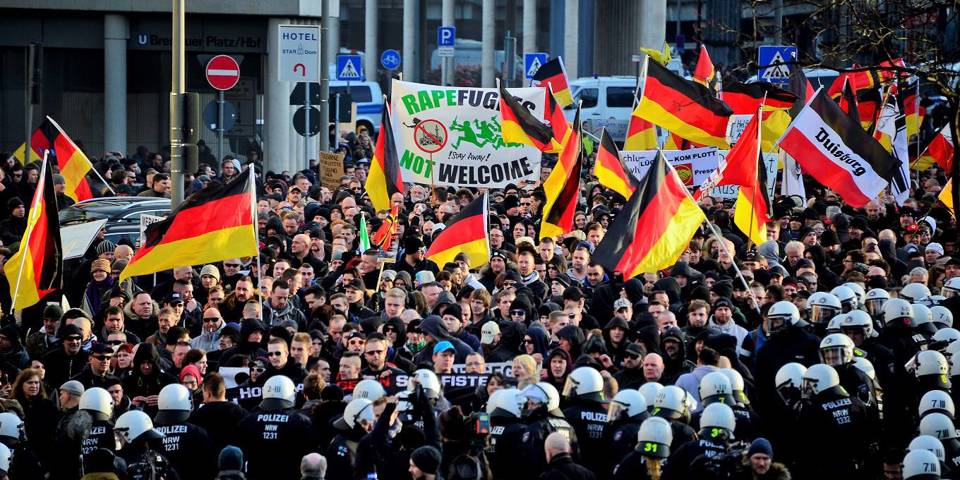The Battle for Germany’s Soul
Carl Bildt

STOCKHOLM – One year after the death of former German Chancellor Helmut Kohl, the country he led for 16 years seems to be struggling with whether or not to follow his legacy.
For Kohl, Germany’s history and central position in Europe meant that it must never pursue national greatness as an end in itself. To his mind, the country with more neighbors than any other country on the continent should not throw its weight around. Rather, it should uphold an idea of Europe in which all countries, large and small, feel equally secure.
But since the start of the refugee crisis in the fall of 2015, Kohl’s vision of Europe has been under attack. While Chancellor Angela Merkel has continued to press for cooperative migration and refugee policies within the European Union, a growing chorus of voices in Germany is advocating unilateral action that would most likely come at the expense of other EU member states.
On the surface, the debate consuming Germany nowadays is about whether to turn away asylum seekers who have already been registered in other EU countries, as the federal interior minister, Horst Seehofer of the Christian Social Union (CSU), has advocated. But at a deeper level, the question for Germany is whether it should go it alone or continue to seek common European solutions.
In this new age of identity politics, the dispute over immigration has become a battle for Germany’s soul. Last September, the Alternative für Deutschland (AfD) became the first far-right party since the 1960s to enter the German Bundestag. Then, after the formation of the current grand coalition government, the AfD became the main opposition party. And now it is pushing the CSU further to the right in the lead-up to Bavaria’s regional election this October.
These developments in Germany are in keeping with trends across Europe, where nationalist and populist parties have made electoral gains by rejecting EU-level solutions and calling for closed borders. In Italy, the nationalist League party appears to be calling the shots in its new governing coalition with the populist Five Star Movement. And in Austria, the far-right Freedom Party is exerting its influence on migration policies as a member of the governing coalition.
If one were to listen to these parties’ rhetoric, one might think that refugees and migrants are pouring into Europe unhindered. But while the Balkans did become a highway for asylum seekers fleeing Syria for Germany and Sweden in 2015 and 2016, that route was effectively closed down when Turkey agreed to host refugees in exchange for EU financial aid. And though the refugee situation in the Central Mediterranean continues to make headlines, the number of migrants crossing from North Africa has actually declined sharply over the past year.
Still, immigration has remained a hot-button issue across Europe, owing to the shock of the initial refugee crisis, which still reverberates in voters’ minds. Politics is about perceptions, not raw numbers. And populist and nationalist parties have managed to paint a picture of a Europe under siege.
In the current political environment, if Germany were to send refugees back to Austria, then Austria would almost certainly send them back to Italy. But that would take the EU back to the same situation that it was in before, when asylum seekers were not being registered on arrival in Italy, and when it was all the more difficult to turn them back at other borders. Inevitably, the situation would degenerate into a volatile mess, with EU member states pitted against one another, and populists commanding center stage.
Kohl’s Germany, by contrast, would consider the European dimension of its policies and shape them accordingly. It would not simply dump its national problems on its smaller neighbors, because it would recognize that their security is synonymous with its own.
The attack on Kohl’s vision by nationalist forces could have ramifications well beyond the immigration debate. At stake is not just Germany’s role in Europe, but also the future of European integration. A Germany that abandons Kohl’s legacy would suddenly become a source of deep uncertainty, rather than a bastion of stability at the center of Europe. With the West already under attack by the likes of Russian President Vladimir Putin and US President Donald Trump, that is the last thing Europe needs.
To be sure, the immediate crisis will most likely be resolved through a series of imperfect compromises – both at the EU level and within Germany’s governing coalition. That, after all, is often how the EU works, as in the case of the Greek sovereign-debt crisis.
The matter is unlikely to end there. German wavering on Kohl’s legacy is a trend that is larger than any single issue. But how the refugee debate plays out in the coming weeks will reveal much about Germany’s future direction – and about the future of Europe.
Carl Bildt was Sweden’s foreign minister from 2006 to October 2014 and Prime Minister from 1991 to 1994, when he negotiated Sweden’s EU accession. A renowned international diplomat, he served as EU Special Envoy to the Former Yugoslavia, High Representative for Bosnia and Herzegovina, UN Special Envoy to the Balkans, and Co-Chairman of the Dayton Peace Conference. He is Chair of the Global Commission on Internet Governance and a member of the World Economic Forum’s Global Agenda Council on Europe.
0 comments:
Publicar un comentario